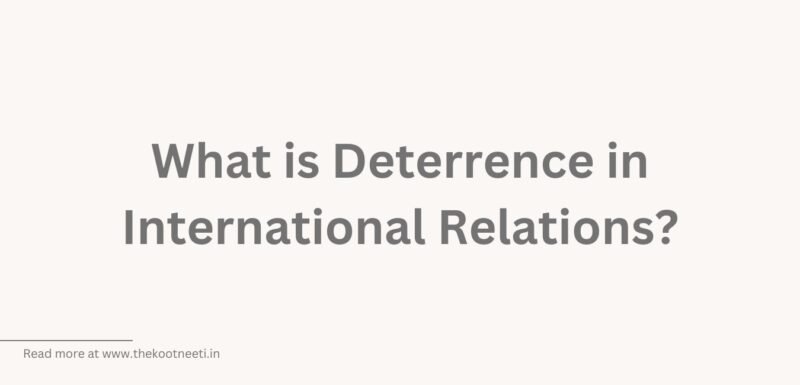What is Deterrence in International Relations?

Deterrence is a strategy used in international relations to prevent or discourage another state or actor from taking an action that is considered undesirable or threatening. The goal of deterrence is to convince the other party that the costs of taking the undesirable action would outweigh the potential benefits.
There are two main types of deterrence:
- Deterrence by denial: This type of deterrence seeks to make it difficult or impossible for the other party to achieve its objectives. This can be done through measures such as military defence systems or economic sanctions.
- Deterrence by punishment: This type of deterrence seeks to convince the other party that the costs of taking the undesirable action would be severe, such as through the threat of military retaliation or economic penalties.
Deterrence can be an effective tool for managing international relations and preventing conflict, but it can also have limitations. For example, it may be difficult to accurately predict how the other party will respond to a deterrence strategy, and it can also lead to an escalation of tensions if the other party responds with its own deterrence measures. As such, it is important to carefully consider the use of deterrence in any given situation.
Difference between Deterrence by Denial and Punishment in the Cyberspace domain
Deterrence by Denial in Cyberspace
Deterrence by denial in cyberspace refers to the use of cyber defences and other measures to deter cyber attacks by making it more difficult or costly for attackers to achieve their objectives. The goal of deterrence by denial is to create barriers or obstacles that make it harder for an attacker to successfully breach a system or network, thereby reducing the incentives for an attack in the first place.
There are many different approaches to deterrence by denial in cyberspace, including the use of technical measures such as firewalls, intrusion detection systems, and encryption, as well as organizational measures such as robust security policies and practices. Deterrence by denial may also involve the use of legal and diplomatic tools, such as sanctions and other forms of international pressure, to discourage cyber attacks.
Deterrence by denial is often seen as an important component of a broader cybersecurity strategy, as it can help to prevent or mitigate the impact of cyber-attacks and to reduce the overall risk of cyber threats. However, it is important to note that deterrence by denial alone may not be sufficient to effectively deter all types of cyber attacks, and it may need to be complemented by other deterrence strategies, such as deterrence by punishment.
Deterrence by Punishment in Cyberspace
Deterrence by punishment in cyberspace refers to the use of threats of retaliation or punishment to deter cyber attacks. The goal of deterrence by punishment is to create a disincentive for an attacker to carry out an attack by imposing costs or consequences on the attacker if an attack is successful.
There are many different approaches to deterrence by punishment in cyberspace, including the use of technical measures such as cyber counterattacks or the disruption of an attacker’s infrastructure, as well as legal and diplomatic measures such as sanctions or other forms of international pressure. Deterrence by punishment may also involve the use of public statements or other forms of communication to signal to potential attackers that they will face consequences if they carry out an attack.
Deterrence by punishment is often seen as an important component of a broader cybersecurity strategy, as it can help to discourage cyber attacks and to reduce the overall risk of cyber threats. However, it is important to note that deterrence by punishment may not always be effective, particularly in cases where an attacker is willing to accept the risks of retaliation or punishment. It may also be difficult to effectively implement deterrence by punishment in some cases, particularly when it is difficult to identify and attribute cyber attacks.



















